Arrow Passage is more effective than any other rehab experience my loved one has had. My family member's counselor, Heidi, went so above and beyond the call of duty, it was amazing. They got my family member on medications they desperately needed to treat depression which ...
About Arrow Passage Recovery
Arrow Passage Recovery believes in an individualized approach of treatment for each individual. They will treat every patient with each of their specifically needs. The program integrates medical care with holistic therapies that will improve the lifestyle of each patient.
At Arrow Passage Recovery in Ohio, their professional staff will understand the underlying effects of alcohol on family, friends, and health. Their proven alcohol rehab program gives patients the tools to beat your alcohol addiction. They will provide help through every step of recovery.
Latest Reviews
At Arrow Passage Recovery, client safety, ethical standards, and high-quality clinical care are our highest priorities. Because of privacy laws, we are unable to address specific details of any individual’s treatment in a public forum, but we take all feedback very seriously. Allegations involving staff conduct, communication, or billing are thoroughly reviewed through our internal compliance and quality-assurance processes.
We want to emphasize that any report of unprofessional behavior or boundary violations is immediately investigated and handled according to state regulations and our policies for client safety. Our leadership team is committed to maintaining a safe, structured, and supportive environment for every person in our care, and we continually evaluate our staff, procedures, and training to ensure those standards are upheld.
We appreciate you bringing your concerns forward and would welcome the opportunity to speak privately so we can review this matter further and address any remaining questions. If you’d like to continue the conversation, please contact our leadership team directly at 866-850-3296
Rehab Score
Gallery



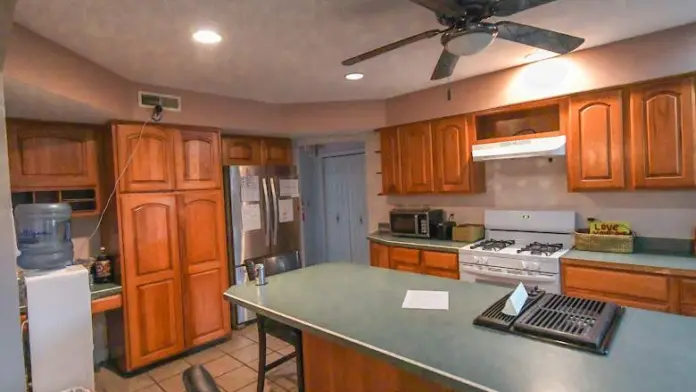

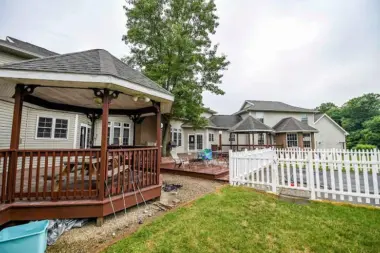
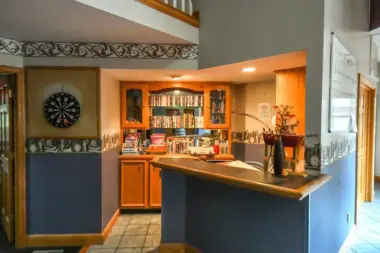
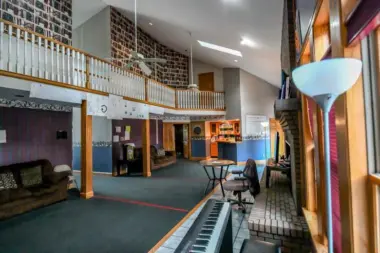
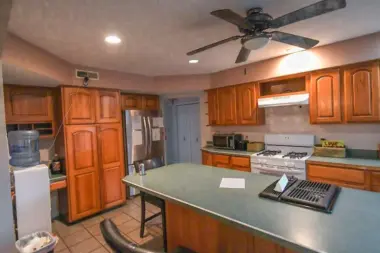
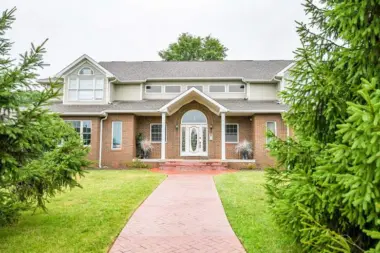
Accepted Insurance
Other Forms of Payment
Private insurance refers to any kind of healthcare coverage that isn't from the state or federal government. This includes individual and family plans offered by an employer or purchased from the Insurance Marketplace. Every plan will have different requirements and out of pocket costs so be sure to get the full details before you start treatment.
Self-pay involves paying for treatment out of your own pocket. You can use savings or credit, get a personal loan, or receive help from family and friends to fund your treatment. If you don't have insurance or your insurance plan doesn't cover a specific program, self-pay can help ensure you still get the care you need.
Medicaid is a state based program that helps lower-income individuals and families pay for healthcare. Medicaid covers addiction treatment so those enrolled can use their coverage to pay for rehab. When a program accepts Medicaid the client often pays very little or nothing out of their own pocket.
Medicare is a federal program that provides health insurance for those 65 and older. It also serves people under 65 with chronic and disabling health challenges. To use Medicare for addiction treatment you need to find a program that accepts Medicare and is in network with your plan. Out of pocket costs and preauthorization requirements vary, so always check with your provider.
Private insurance refers to any kind of healthcare coverage that isn't from the state or federal government. This includes individual and family plans offered by an employer or purchased from the Insurance Marketplace. Every plan will have different requirements and out of pocket costs so be sure to get the full details before you start treatment.
Addiction Treatments
Levels of Care
Outpatient Programs (OP) are for those seeking mental rehab or drug rehab, but who also stay at home every night. The main difference between outpatient treatment (OP) and intensive outpatient treatment (IOP) lies in the amount of hours the patient spends at the facility. Most of the time an outpatient program is designed for someone who has completed an inpatient stay and is looking to continue their growth in recovery. Outpatient is not meant to be the starting point, it is commonly referred to as aftercare.
IOP may be recommended for those who do not need medically-supervised detox. IOP can also enable people in recovery to continue their recovery therapies following successful detox, on a part-time yet intensive schedule, designed to accommodate work and family life. Start rebuilding your personal life and mending your important family ties right away, when you participate in intensive outpatient treatment at Arrow Passage Recovery. With our Intensive Outpatient Treatment program, you are able to establish a foundation for long term recovery support in your local community right from the start of your treatment. At Arrow Passage Recovery Intensive Outpatient Program, you receive services primarily through group therapy, but you will also be assigned an individual therapist you will meet with on a weekly basis while in treatment. Groups are small and generally do not exceed 10 people, allowing for a safe environment. In IOP you continue your life with support from the local clinical, emotional and peer support systems provided by Arrow Passage Recovery. Our IOP usually runs for a period of 8 (eight) weeks but every patient is different. Your treatment program will be designed just for you, so treatment may run more or less than eight weeks if needed.
Rehab aftercare programs are designed to ensure clients receive continuing care while in the maintenance phase of recovery. Some clients may be in outpatient treatment, which is generally considered to be an element of drug rehab aftercare. The specific services provided in these programs are often determined by the client's case manager and care team in consultation with the client. Common services include peer coaching, career counseling, and 12 step program induction.
It is said that our recovery is based on the daily maintenance of our spiritual program. The 12-step model for addiction treatment and recovery is the program designed to help us achieve that daily maintenance. The program today is considered the mainstream of the recovery movement. It is an integral part of the alcohol and drug rehab process. The steps as they say are but suggestive only. In a world that for many of us has been a very dark and foreboding place, the 12-steps give a linear guideline for the process of recovery and a promise that should we follow these steps, that we will know freedom and we will be able to comprehend the word serenity. However, Arrow Passage Recovery offers many different treatment programs. 12 step based programs are not the only way to successfully break the chains of your addiction.
Drug and alcohol addictions not only affect the user but the entire family. Dealing with a loved one who has an addiction problem can be challenging and leave those close to the person feeling helpless and unsure of how to help. An intervention is a planned attempt by one or more of the addict's family and friends to get the loved one into treatment for the addiction. The addict is not included in the planning of the intervention. Family and friends will have an opportunity to share how the addict has affected their lives. The addict will be offered a treatment plan that is arranged ahead of time, and it will have clear goals and guidelines. If treatment is refused, family and friends should spell out what will they will do. Drug or alcohol intervention specialists at Arrow Passage Recovery can help you plan and implement an intervention. APR, has qualified professionals who can help carry out an intervention. A poorly planned intervention may actually make the situation worse. If your loved one feels attacked, he or she may become more isolated and more resistant to treatment. Involving a professional can help to avoid this. A professional is a must if your loved one has a history of mental illness, is suicidal, has a history of violence, is in denial or is likely to become angry at the intervention. An interventionist will suggest the best approach to take with your loved one and help you to help your loved one's particular circumstances.
A partial hospitalization program (PHP) is a short-term form of intensive rehab, usually for those with acute symptoms that are hard to manage but don’t require 24-hour care. PHPs have structured programming (i.e. individual and/or group therapy), and usually meet 3-5 days a week for around 6 hours (i.e. 9am-3m). Some PHPs are residential (patients sleep on site) and some are not, so patients sleep at home. PHPs can last from 1-6 months, and some offer transportation and meals.
At certain points in the recovery process, it's important to have support available 24/7. 24-hour clinical care offers a safe environment in which to recover from drug or alcohol addiction in peace, knowing medical detox and other treatment will happen with professionals on hand.
During rehab, your loved one will work through a lot of their issues and triggers – the things that brought them to a life of addiction and have held them captive in that life. But, before rehab can start, we need to clean the drugs, alcohol or both out of their system by attending a trusted, and reputable detox program for alcohol or drugs. Detox can be done on both an outpatient basis (at mental health centers, addiction clinics or private clinics) or inpatient (at a hospital or residential treatment center). Inpatient drug treatment in Ohio begins at Arrow Passage Recovery. APR closely monitors patients through the detox process. This prevents use of any substances and speeds up the process of detoxification. The choice of setting depends on many factors such as the drug of abuse, amount and length of history of abuse, psychosocial issues, patient's age, and co-existing medical and/or psychiatric conditions among others. Upon the initial assessment by Arrow Passage Recovery we will decide the best detox option for you or your loved one. In order to withdraw from certain addictive substances safely, it may be preferable and in some cases necessary to undergo medically supervised detox in a residential treatment center that has a detoxification unit. Arrow Passage Recovery works closely with the most elite drug and alcohol detoxification facilities to ensure your recovery is a successful one.
Clients who have just completed detox or who are at an increased risk of relapse, such as those experiencing a life crisis, typically enroll in an inpatient rehab. There, they receive housing, meals, and intensive clinical supervision. Inpatient treatment typically involves extensive individual, group, and family therapy. Clients may also participate in life skills training to support their long-term sobriety. Integrative rehab centers offer a variety of evidence-based holistic therapies, such as meditation or equine therapy.
Treatments
The goal of treatment for alcoholism is abstinence. Those with poor social support, poor motivation, or psychiatric disorders tend to relapse within a few years of treatment. For these people, success is measured by longer periods of abstinence, reduced use of alcohol, better health, and improved social functioning. Recovery and Maintenance are usually based on 12 step programs and AA meetings.
Drug rehab in Ohio provides comprehensive treatment to address the physical and psychological needs of those struggling with substance use disorders. This may involve inpatient and/or outpatient care.
When a patient receives a dual diagnosis, it means he or she has both a mental health disorder and a drug and/or alcohol addiction at the same time. The patient may have multiple mental health disorders or the patient may have multiple substance addictions. In order to properly treat a patient with dual diagnosis, each disorder must be accurately diagnosed and treated separately. If you feel like you may have a dual diagnosis, there is help available.
A combined mental health and substance abuse rehab has the staff and resources available to handle individuals with both mental health and substance abuse issues. It can be challenging to determine where a specific symptom stems from (a mental health issue or an issue related to substance abuse), so mental health and substance abuse professionals are helpful in detangling symptoms and keeping treatment on track.
Opioid rehabs specialize in supporting those recovering from opioid addiction. They treat those suffering from addiction to illegal opioids like heroin, as well as prescription drugs like oxycodone. These centers typically combine both physical as well as mental and emotional support to help stop addiction. Physical support often includes medical detox and subsequent medical support (including medication), and mental support includes in-depth therapy to address the underlying causes of addiction.
Programs
Adult rehab programs include therapies tailored to each client's specific needs, goals, and recovery progress. They are tailored to the specific challenges adult clients may face, including family and work pressures and commitments. From inpatient and residential treatment to various levels of outpatient services, there are many options available. Some facilities also help adults work through co-occurring conditions, like anxiety, that can accompany addiction.
Recovery is most successful when clients feel accepted and validated by their peers and treatment providers. Facilities that offer LGBTQ-inclusive programming are committed to creating a safe space where everyone can grow and recover without fear of judgment or discrimination. They will have dedicated policies in place to create a safe and supportive environment that fosters free expression.
Young adulthood can be an exciting, yet difficult, time of transition. Individuals in their late teens to mid-20s face unique stressors related to school, jobs, families, and social circles, which can lead to a rise in substance use. Rehab centers with dedicated young adult programs will include activities and amenities that cater to this age group, with an emphasis on specialized counseling, peer socialization, and ongoing aftercare.
Serving in the military is both mentally and physically challenging, and can result in trauma that persists even after combat ends. Military programs are tailored to the specific and often complex needs of active duty personnel, veterans, and military families. Clients often access these programs through the U.S. Department of Veterans Affairs (VA).
Clinical Services
Cognitive Behavioral Therapy (CBT) is a therapy modality that focuses on the relationship between one's thoughts, feelings, and behaviors. It is used to establish and allow for healthy responses to thoughts and feelings (instead of unhealthy responses, like using drugs or alcohol). CBT has been proven effective for recovering addicts of all kinds, and is used to strengthen a patient's own self-awareness and ability to self-regulate. CBT allows individuals to monitor their own emotional state, become more adept at communicating with others, and manage stress without needing to engage in substance abuse.
The main goals of dialectical behavior therapy are to teach you how to regulate your emotions, develop positive ways to cope with stress, improve your relationships, and live in the moment. This therapy lasts about six months and involves weekly individual and group sessions.
Group therapy is any therapeutic work that happens in a group (not one-on-one). There are a number of different group therapy modalities, including support groups, experiential therapy, psycho-education, and more. Group therapy involves treatment as well as processing interaction between group members.
In individual therapy, a patient meets one-on-one with a trained psychologist or counselor. Therapy is a pivotal part of effective substance abuse treatment, as it often covers root causes of addiction, including challenges faced by the patient in their social, family, and work/school life.
Whether a marriage or other committed relationship, an intimate partnership is one of the most important aspects of a person's life. Drug and alcohol addiction affects both members of a couple in deep and meaningful ways, as does rehab and recovery. Couples therapy and other couples-focused treatment programs are significant parts of exploring triggers of addiction, as well as learning how to build healthy patterns to support ongoing sobriety.
Research clearly demonstrates that recovery is far more successful and sustainable when loved ones like family members participate in rehab and substance abuse treatment. Genetic factors may be at play when it comes to drug and alcohol addiction, as well as mental health issues. Family dynamics often play a critical role in addiction triggers, and if properly educated, family members can be a strong source of support when it comes to rehabilitation.
Art therapy can be a powerful complement to a 12-Step program. Per Art Therapy: Journal of the American Art Therapy Association, clients can use artistic activities to uncover the feelings of guilt, unmanageability, or shame that led them to rehab. For instance, a process known as incident drawings allows clients to illustrate the experiences of feeling self-destructive or out of control, which can lead them to seek healing through a higher power. Therapists often use fluid media, like paint, to help clients experience the sensation of being out of control, which in turn helps them admit their need for sobriety. Art therapy highlights the role of creative activity as a form of nonverbal communication. Language is not always the most effective way to convey the emotions that are uncovered in the recovery process. Art therapy can act as a powerful complement to traditional talk therapy by giving clients an alternative way to describe and communicate their feelings. Once these feelings have been released, art provides a visible, tangible object that can be discussed with the therapist and with peers in a group setting.
Amenities
-
Private Setting
-
Yoga Studio
Staff & Accreditations
Staff
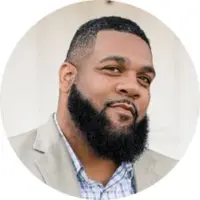
Joeseph Turner
Case Manager & Alumni President

Tamara Lutz, PRS, CDCA
Arch/Aftercare Director

Justin Boney, LPCC-S
Clinical Director

Danielle Stewart, LPCC-S
Clinical Director
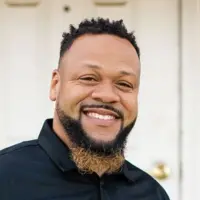
Emmanuel Turner
Director of Operations
Accreditations

The Joint Commission, formerly known as JCAHO, is a nonprofit organization that accredits rehab organizations and programs. Founded in 1951, the Joint Commision's mission is to improve the quality of patient care and demonstrating the quality of patient care.
Joint Commission Accreditation: Yes
Accreditation Number: 600167

The National Association of Addiction Treatment Providers (NAATP) is a professional association that represents organizations in the field of addiction services. Founded in 1978, NAATP's mission is to advance addiction services and ensure that high-quality addiction treatment is available and accessible.
NAATP Member: Yes
Member ID: 11290

The Commission on Accreditation of Rehabilitation Facilities (CARF) is a non-profit organization that specifically accredits rehab organizations. Founded in 1966, CARF's, mission is to help service providers like rehab facilities maintain high standards of care.
CARF Accreditation: Yes

The Substance Abuse and Mental Health Services Administration (SAMHSA) is a branch of the U.S. Department of Health and Human Services. Established in 1992 by congress, SAMHSA's mission is to reduce the impact of substance abuse and mental illness on American's communities.
SAMHSA Listed: Yes

State Licenses are permits issued by government agencies that allow rehab organizations to conduct business legally within a certain geographical area. Typically, the kind of program a rehab facility offers, along with its physical location, determines which licenses are required to operate legally.
State License: Ohio
Contact Information
721 Lincoln Way E
Massillon OH, 44646


